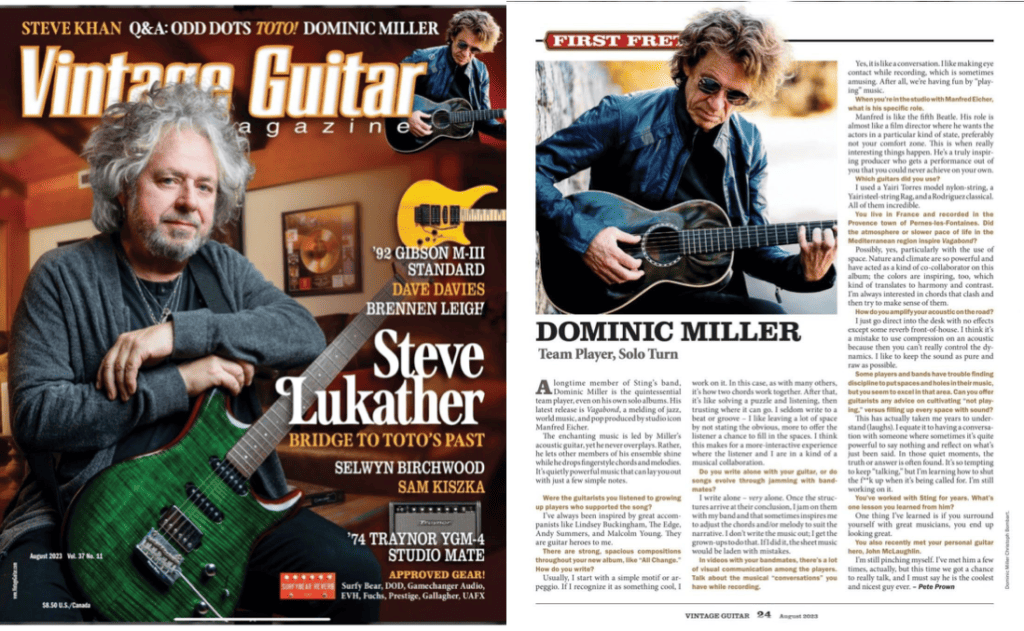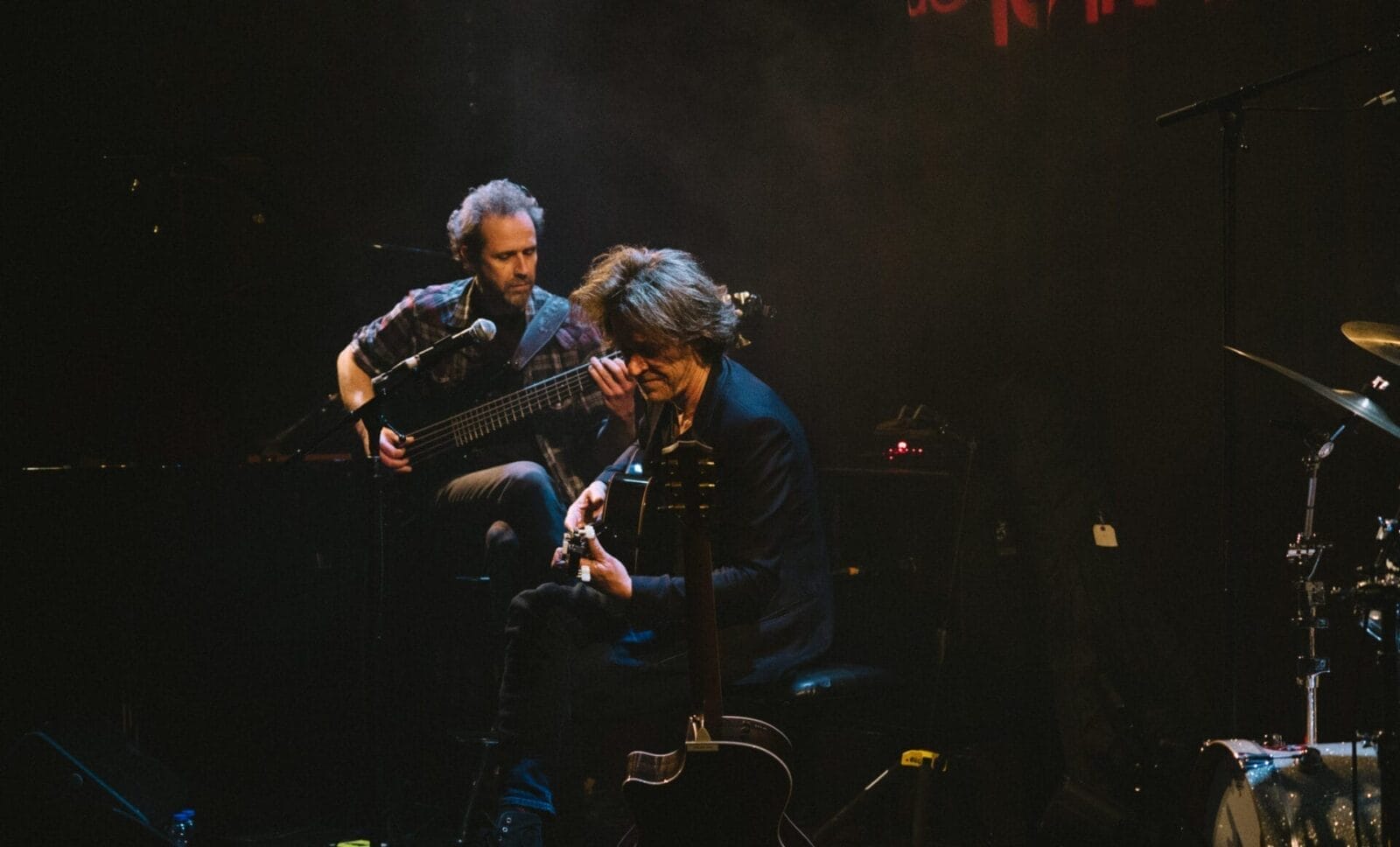スティングのバンド、ドミニク・ミラーは長年のメンバーであり、自身のソロアルバムでもチームプレーの真髄を発揮している。
彼の最新作は『Vagabond』、 ジャズ、ワールドミュージック、ポップスを融合させたこのアルバムは、スタジオのアイコン的存在であるマンフレート・アイヒャーがプロデュースした。
ミラーのアコースティック・ギターがリードする魅惑的な音楽だが、決してオーバープレイではない。むしろ 彼がフィンガー・スタイルのコードとメロディーを落としながら、他のアンサンブル・メンバーを輝かせる。シンプルな数音で聴く者を圧倒する、静かで力強い音楽だ。
Q:あなたが子供の頃に聴いていたギタリストは幼少期に聴いていたギタリストたちは、この曲を支えていたのでしょうか?
DM : 私はいつもリンジー・バッキンガム、エッジ、アンディ・サマーズ、マルコム・ヤングのような偉大なアコギ奏者からインスピレーションを受けてきました。彼らは僕にとってギターのヒーローなんだ。
Q:あなたの新しいアルバムには、「All Change」のような、力強く広々とした構成がありますね。どのように作曲するのですか?
DM : いつもは、シンプルなモチーフやアルペジオから始めるんだ。もしそれがクールなものだとわかったら私はそれに取り組んでいる。この場合、他の多くの場合と同様に2つの和音がどのように組み合わされるかだ。その後はパズルを解くようなものだ。
どこに行けるかを信頼するんだ。私はめったにビートやグルーヴに合わせて書くことはあまりない。
私は、明白なことを述べず、聴き手にスペースを埋める機会を提供することで、多くのスペースを残すことが好きなんだ。聴き手がそのスペースを埋められるようにね。そうすることで そうすることで、よりインタラクティブな体験ができる。リスナーと私がある種の音楽的コラボレーションのようなものです。
Q:ギターを持って一人で作曲するんですか、それともバンド・メンバーとのジャム・セッションを通じて発展させていくのですか?
DM : 私は一人で書いている。構造が完成したら、バンドとジャムするんだ。コードやメロディーを物語に合うように調整する。物語に合わせてコードやメロディを調整することもある。私は譜面を書かない。よく解っている経験豊富な人達にやってもらう。もし僕がやったら、楽譜は間違いだらけになってしまう。
Q:バンドメンバーとのビデオでは、演奏者間の視覚的なコミュニケーションが多いですね。音楽的な “会話 “について教えて下さい。
DM : そう、会話のようなものだ。そうだね。録音中に目を合わせるのが好きなんだ。面白い。結局のところ、私たちは音楽を “演奏する “ことで楽しんでいるのです。
Q:マンフレート・アイヒャーとスタジオにいるとき、彼の具体的な役割は何ですか?
DM : マンフレートは5人目のビートルズのようなものだ。彼の役割は映画監督のようなものです。俳優を特定の状態にする。コンフォートゾーンではない状態。そうすることで面白いことが起こるんだ。彼は、自分ひとりでは決してできないような演技を引き出す、本当に刺激的なプロデューサーなんだ。彼は本当にインスピレーションを与えてくれるプロデューサーだ。
Q:今回どのギターを使いましたか?
DM : K-ヤイリのトーレス・モデルのナイロン弦、スチール弦のラグ、そしてロドリゲスのクラシック。どれも素晴らしかった。
Q:あなたはフランス在住で、プロヴァンスの町ペルヌ・レ・フォンテーヌでレコーディングを行いました。地中海地方の雰囲気やゆったりとした生活ペースが『Vagabond』にインスピレーションを与えたのでしょうか?
DM : 特に空間の使い方はそうかもしれない。自然や気候はとてもパワフルで、このアルバムでは共同制作者のような役割を果たしている。色彩もインスピレーションを与えるもので、調和やコントラストに通じるものがある。私はいつも、ぶつかり合う和音に興味を持ち、その意味を理解しようとする。
Q:アコースティックギターのアンプはどのように使っていますか?
DM : エフェクトはかけずに、ただダイレクトにPAのコンソールデスクに入れる。フロント・オブ・ハウスのリバーブ以外はね。アコースティックにコンプレッションを使うのは間違いだと思う。ダイナミクスをコントロールできないからだ。僕はできるだけ生の音を保ちたいんだ。
Q:プレイヤーやバンドの中には、音楽に空間や穴をあける規律を見つけるのが苦手な人もいますが、あなたはその分野に秀でているようですね。ギタリストに、すべての空間を音で埋め尽くすのではなく、“演奏しない “ことを養うためのアドバイスをいただけますか?
DM : これを理解するのに何年もかかったよ(笑)。私はそれを誰かと会話することに例えている。何も言わずに、今言われたことを振り返ってみると、とても力強いことがある。そのような静かな瞬間に、真実や答えが見つかることが多い。
話し続けることはとても魅力的なことだけど、私はそれを求められたときにどうすれば黙ることができるかを学んでいる。私はまだそれに取り組んでいる。
Q:スティングとは何年も一緒に仕事をしていますね。彼から学んだことは何ですか?
DM :私が学んだことのひとつは、素晴らしいミュージシャンに囲まれていれば、結果的に素晴らしいものになるということだ。偉大に見えるということだ。
Q:あなたは最近、個人的なギターヒーロー、ジョン・マクラフリンにも会いましたね。
DM :まだ夢みたいで自分の頬をつねっているんだ。実は彼とは何度か会っているんだけど、今回は本当に話す機会があったんだ、 彼は最高にクールでナイスガイだよ。
Sting’s band,Dominic Miller A longtime member of is the quintessential team player, even on his own solo albums. His latest release is Vagabond, a melding of jazz, world music, and pop produced by studio icon Manfred Eicher. The enchanting music is led by Miller’s acoustic guitar, yet he never overplays. Rather, he lets other members of his ensemble shine while he drops finger style chords and melodies. It’s quietly powerful music that can lay you out with just a few simple notes.
Q: Were the guitarists you listened to growing up players who supported the song?
DM : I’ve always been inspired by great accompanists like Lindsey Buckingham, The Edge,Andy Summers, and Malcolm Young. They are guitar heroes to me.
Q:There are strong, spacious compositions throughout your new album, like “All Change.” How do you write?
DM : Usually, I start with simple motif or arpeggio. If I recognize it as something cool, I work on it. In this case, as with many others, it’s how two chords work together. After that, it’s like solving a puzzle and listening, then trusting where it can go. I seldom write to a beat or groove – I like leaving a lot of space by not stating the obvious, more to offer the listener a chance to fill in the spaces. I think this makes for a more-interactive experience where the listener and I are in a kind of a musical collaboration.
Q:Do you write alone with your guitar, or do songs evolve through jamming with band-mates?
DM : I write alone – very alone. Once the structures arrive at their conclusion, I jam on them with my band and that sometimes inspires me to adjust the chords and/or melody to suit the narrative. I don’t write the music out; I get the grown-ups to do that. IfI did it, the sheet music would be laden with mistakes.
Q:In videos with your bandmates, there’s a lot of visual communication among the players. Talk about the musical “conversations” you have while recording.
DM : Yes, it is like a conversation. I like making eye contact while recording, which is sometimes amusing. After all, we’re having fun by “play-ing” music.
Q:When you’re in the studio with Manfred Eicher, what is his specific role.
DM : Manfred is like the fifth Beatle. His role is almost like a film director where he wants the actors in a particular kind of state, preferably not your comfort zone. This is when really interesting things happen. He’s a truly inspir-ing producer who gets a performance out of you that you could never achieve on your own.
Q:Which guitars did you use?
DM : I used a Yairi Torres model nylon-string, a Yairi steel-string Rag, and a Rodriguez classical. All of them incredible.
Q:You live in France and recorded in theProvence town of Pernes-les-Fontaines. Did the atmosphere or slower pace of life in the Mediterranean region inspire Vagabond?
DM : Possibly, yes, particularly with the use of space.
Nature and climate are so powerful and have acted as a kind of co-collaborator on this album; the colors are inspiring, too, which kind of translates to harmony and contrast. I’m always interested in chords that clash and then try to make sense of them.
Q:How do you amplify your acoustic on the road?
DM : I just go direct into the desk with no effects except some reverb front-of-house. I think it’s a mistake to use compression on an acoustic because then you can’t really control the dynamics. I like to keep the sound as raw as possible.
Q:Some players and bands have trouble finding discipline to put spaces and holes in their music, but you seem to excel in that area. Can you offer guitarists any advice on cultivating “not playing,” versus filling up every space with sound?
DM : This has actually taken me years to understand (laughs). I equate it to having a conversation with someone where sometimes it’s quite powerful to say nothing and reflect on what’s just been said. In those quiet moments, the truth or answer is often found.
It’s so tempting to keep “talking,” but I’m learning how to shut the f**k up when it’s being called for. I’m still working on it.
Q:You’ve worked with Sting for years. What’s one lesson you learned from him?
DM : One thing I’ve learned is if you surround yourself with great musicians, you end up looking great.
Q:You also recently met your personal guitar hero, John McLaughlin.
DM : I’m still pinching myself. I’ve met him a few times, actually, but this time we got a chance to really talk, and I must say he is the coolest and nicest guy ever.



